Why Custom Software Development is Important?

Nearly 70% of top performing companies say custom software sets them apart. Meaning that custom these companies are using custom software for many good reasons which are,
- Custom software aligns with unique business needs, helping companies innovate and gain a clear competitive advantage.
- It streamlines workflows, automates tasks, and improves productivity through seamless system integration.
- Tailored solutions provided by software companies like Xponent ensure flexibility, long-term savings, and strong data security for businesses.
With these benefits, companies meet unique business requirements and gain a competitive edge.
This article explains why custom software development is important for efficiency, and long-term success.
Why Custom Software Development is Important: Key Reasons
Understanding why custom software development is important means looking at its key advantages. This section explores how tailored software solutions deliver significant benefits across crucial areas like strategy, operational efficiency, scalability, cost effectiveness, and security.
Reason #01: Offers Strategic Benefits Through Custom Solutions
Custom software solutions offer strategic benefits by aligning technology with unique business objectives. This helps innovation, improves user experience, and drives lasting business growth.
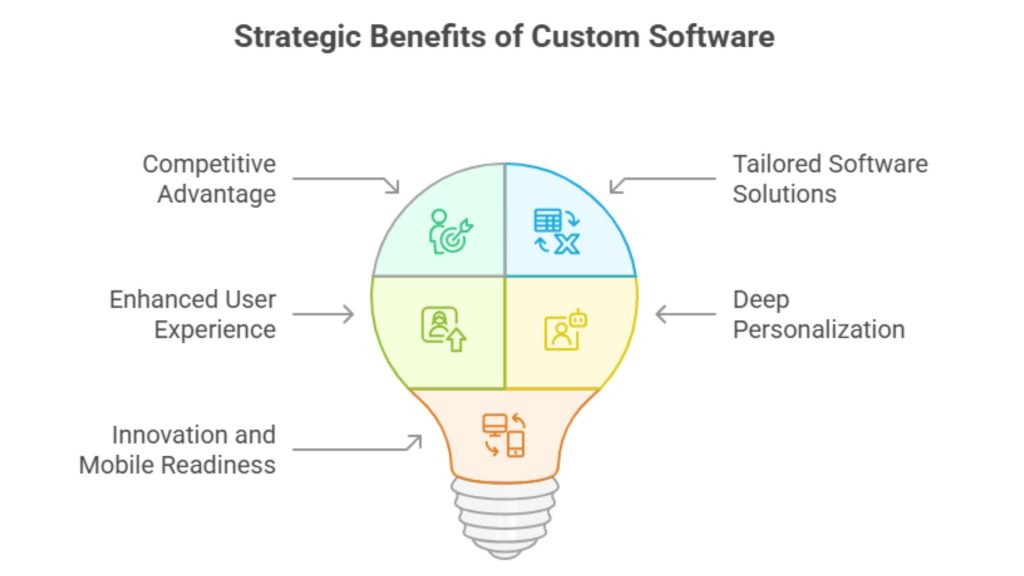
Gaining a Competitive Advantage
Custom software builds distinct capabilities that generic off-the-shelf software lacks. This helps companies develop unique offerings and services, strengthening market position. Businesses can then deliver specialized products that outperform competitors.
Reports indicate over 70% of businesses see improved agility and innovation after using specialized custom systems, helping achieve market differentiation.
Delivering Tailored Software Solutions
Bespoke software matches a company’s exact business requirements and business processes. It provides precisely the functionality a business needs, avoiding unnecessary features of generic software. This aligns technology perfectly with specific workflows, ensuring the software adapts to the business.
Enhancing User Experience (UX) and Customer Satisfaction
Superior UX/UI design in custom applications creates an easy-to-use user experience. This increases customer satisfaction because users easily accomplish tasks and engage with the software. A positive experience builds strong brand loyalty, improves reputation, and drives business growth.
Enabling Deep Personalization
Custom software enables deep personalization, letting users tailor workflows to their preferences. This creates personalized systems that automate tasks, reduce distractions, and improve employee productivity.
Research from Oxford University shows satisfied employees are 13% more productive. Tailored interfaces increase adoption rates and job satisfaction.
Helping Innovation and Mobile App Readiness
Custom software development future-proofs a company by readily integrating emerging technologies. It enables novel features from AI & Machine Learning or IoT, improving user experiences.
Custom mobile app development also enhances business performance and prepares your company for future opportunities.
Reason #02: Improves Operational Efficiency and Productivity
Custom software improves operational efficiency and productivity. It streamlines workflows, automates complex business processes, and ensures integration across systems.
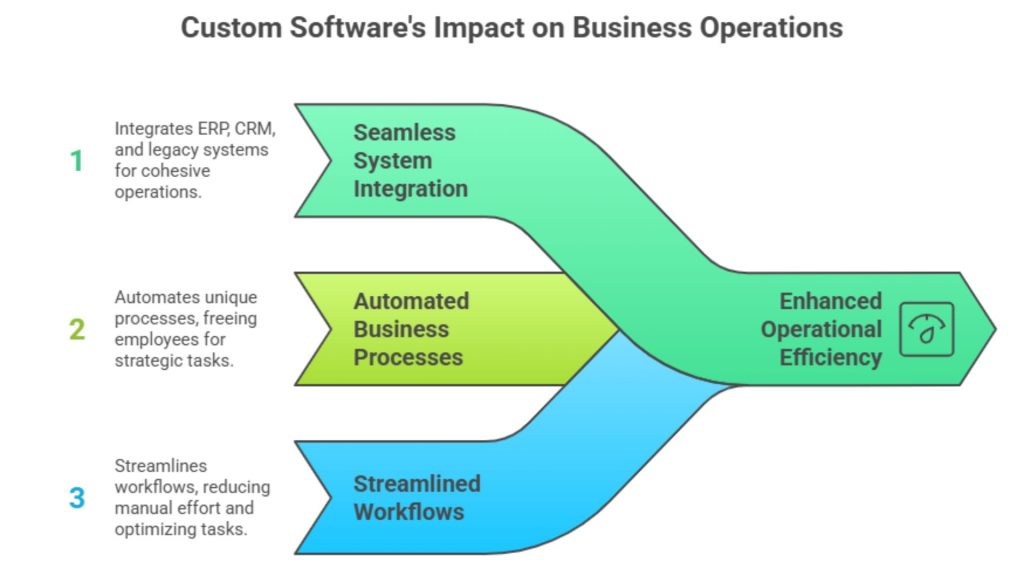
Achieving Seamless System Integration
Custom software integrates various systems like ERP systems, CRM systems, and legacy systems. This improves data flow and real-time insights, eliminating data silos for cohesive operations. Companies report at least a 67% increase in operational efficiency through these integrations, making data-driven decisions simpler.
Boosting Operational Efficiency and Productivity
Custom software solutions are designed to automate unique business processes and repetitive tasks. This significantly boosts efficiency and productivity. It frees up employee time from manual work, letting them focus on more strategic tasks.
Accelerating Workflows with Fast Software Integration
Fast software integration helps custom solutions streamline workflows. This reduces manual effort and improves overall operational efficiency. It ensures your business functions smoothly and rapidly, optimizing every task.
Reason #03: Provides Scalability and Flexibility for Evolving Business Requirements
Custom software brings scalability and adaptability. Your company can then evolve without technology limits. It ensures your software solutions grow with you, supported by dedicated support and full ownership.
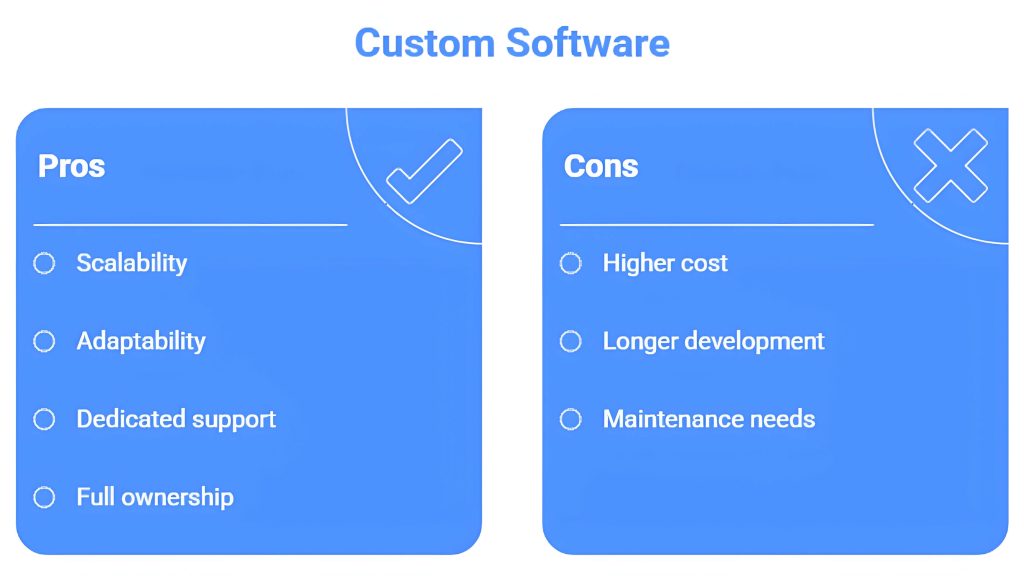
Ensuring Future Scalability and Business Growth
Custom software has built-in Scalability for future expansion. It lets businesses grow and adapt to more users or data without outgrowing their software solutions. This helps facilitate continuous scaling.
Guaranteed Long-Term Support and Maintenance
Dedicated support and maintenance keeps your custom software product functional and up-to-date. This ensures it aligns with evolving business requirements. This ongoing investment safeguards your systems longevity and performance.
Gaining Full Ownership and Control
A company retains full intellectual property and ownership of their proprietary software (Bespoke software). This gives complete control over its evolution and modifications. It means freedom from vendor roadmaps.
Reason #04: Helps Achieving Cost-Effectiveness and Long-Term Savings
Custom Software Development often needs an initial investment. However, it is highly cost-effective over time. It eliminates unnecessary expenses and licenses, delivering substantial long-term savings and a strong return on investment.
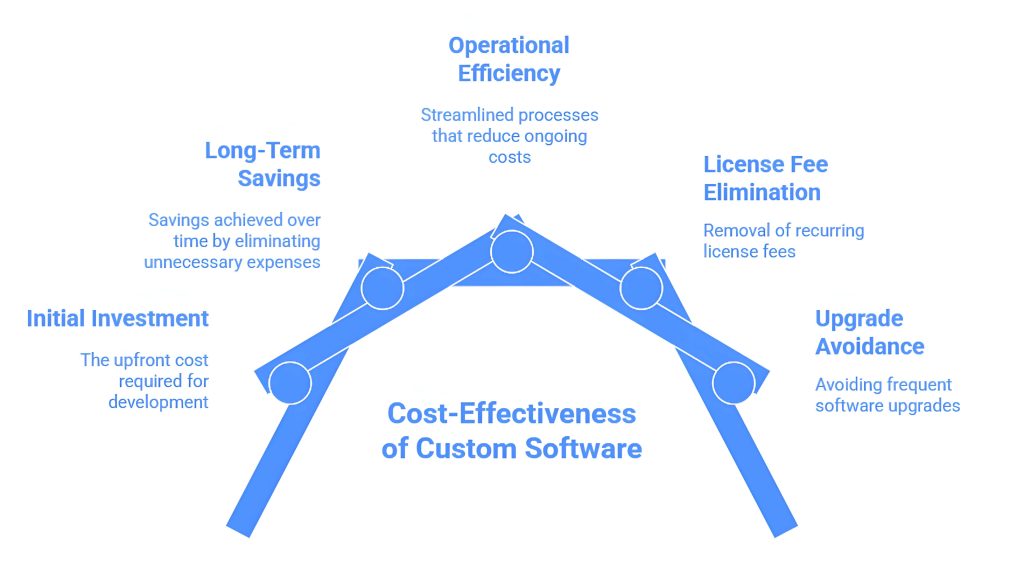
Driving Cost-Effectiveness Over Time
Custom software lowers ongoing operational expenses. It uses tailor-made automation processes and creates efficiency gains. This leads to clear cost effectiveness over time, despite upfront costs.
Realizing Significant Long-Term Savings
Custom Software Development removes unnecessary license fees and redundant features. It also avoids frequent upgrades of off-the-shelf software. This creates substantial long-term savings and a better investment return for your company.
Reason #05: Brings Enhanced Security and Control Over Your Data
Custom software brings strong security features and deep control over your data. This protects sensitive information. It ensures compliance with industry security standards and regulatory rules, greatly reducing security risks.
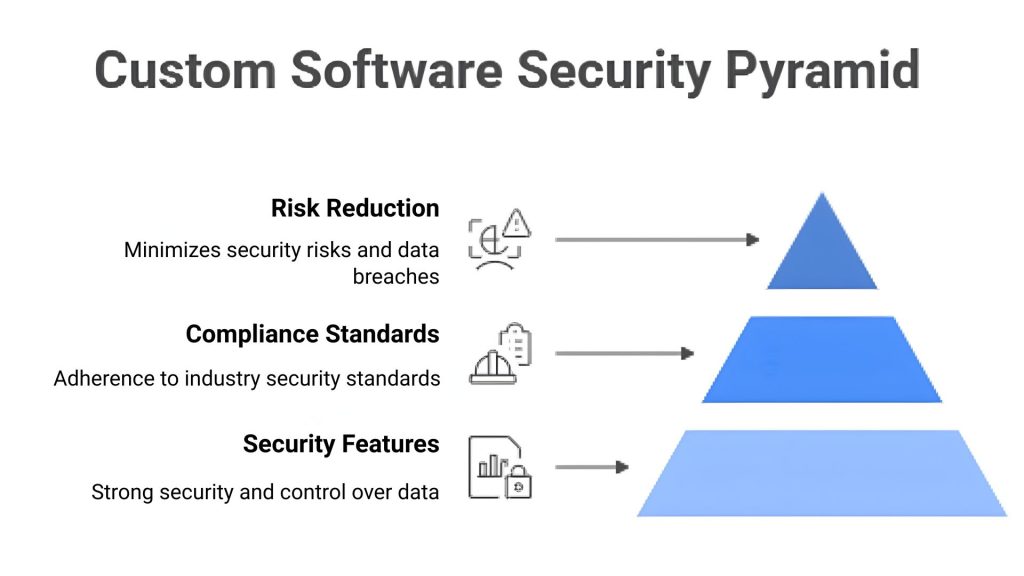
Strengthening Data Security and Mitigating Risks
Custom Software Development implements robust, industry-specific security features. It follows strict security standards. This greatly reduces security risks and protects against a data breach better than generic products. Your data stays secure.
Ensuring Industry-Specific Regulatory Compliance
Custom software meets specific regulatory compliance needs, crucial in sectors like healthcare and finance. Custom solutions ensure your company follows complex legal frameworks and avoids penalties.
Custom vs. Off-the-Shelf Software: A Comprehensive Comparison
Main differences include customization, cost, deployment speed, and long-term agility. Custom software is built for specific business needs, offering tailored features and scalability. Off-the-shelf software is generic, faster to implement, and cheaper upfront, but less adaptable.
Custom software solutions are designed from the ground up to perfectly fit a company’s unique business requirements. They offer precise control over features, security, and scalability. This leads to superior user experience and operational efficiency. However, it typically involves a higher initial investment and longer software development time.
Off-the-shelf software provides a ready-made product for immediate deployment at a lower upfront cost. Yet, it often compromises on specific functionalities, system integration, and long-term flexibility, potentially slowing down a company’s competitive advantage as business processes expand.
Choosing between them depends on a company’s specific business outcomes and strategic investment priorities.
Here is the feature difference table of custom vs. off-the-shelf software:
| Feature | Custom Software Development | Off-the-Shelf Software |
| Customization | Built to exact business requirements | Standardized features, limited customization |
| Cost | Higher initial investment, lower long-term savings (no license fees) | Lower upfront costs, ongoing license fees |
| Time to Market | Longer development cycle | Rapid deployment |
| Flexibility | Highly adaptable, evolves with business growth | Less flexible, adapts business to software |
| Ownership | Full ownership and intellectual property | Licensed use, no ownership |
| Integration | Seamless integration with existing systems | Often requires workarounds or expensive APIs for system integration |
| Competitive Edge | Provides unique competitive advantage | Standardized functionality, less differentiation |
| Support | Dedicated development partner support | Vendor-driven support, potentially less responsive |
| Security | Tailored security features, meets specific security standards | Generic security, vulnerabilities might be common targets |
The Future of Custom Software Development
The future clearly shows why custom software development is growing. Cognitive Market Research projects the global custom software development market to reach $592.27 billion by 2033. This will be with 12.31% annual growth. This demand is high.
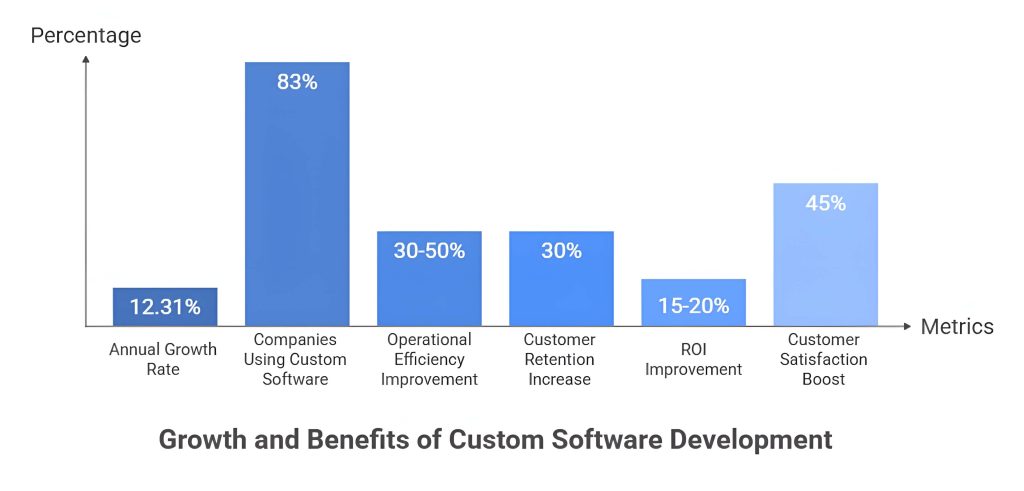
A 2023 Clutch survey found over 83% of companies now use custom software. This proves its vital role for businesses and their specific business requirements.
Businesses are choosing custom software solutions for real results. Clutch reports 30% to 50% better operational efficiency. There is also a 30% rise in customer retention. ROI is 15% to 20% higher than with generic software.
Customer satisfaction can jump by 45% because custom software perfectly fits user needs. This all helps companies gain a clear competitive edge.
Big trends will drive custom software forward. AI & Machine Learning will automate coding and tasks. They will offer smart insights for software solutions. Low-Code/No-Code Platforms will speed up development.
Gartner predicts 70% of new applications will use LCNC by 2025. This makes software solutions easier for more people to build.
Cloud-Native Architectures will be dominant. 95% of digital workloads are expected on cloud platforms by 2025. This means great scalability and strength for custom applications.
New strategies also matter. Modular Architecture (microservices) brings more agility for custom software. Edge Computing will process data faster. This is vital for low-latency applications in sectors like manufacturing and healthcare.
Agile and DevOps methods will help businesses quickly adapt to market changes. They also improve work with a development partner, showing custom software’s lasting value.
Finding the right development partner to face these complexities and build future-proof custom software solutions is paramount. At Xponent, we specialize in bridging this gap, offering expert software development for tailored, secure, and scalable needs.
FAQs
Why is custom software development essential for startups and small businesses?
It is essential because it gives a competitive advantage and agile software solutions for niche business requirements. Custom software also brings scalability for rapid business growth, avoiding off-the-shelf software limits and extra expenses.
Who Needs Custom Software Solutions?
Businesses with unique business processes, complex systems to integrate, or strict security rules need it. Also, companies seeking a clear competitive edge or strong scalability benefit most from custom software solutions.
What are the key differences between custom software and off-the-shelf solutions?
Key differences include customization, cost, deployment speed, and long-term agility. Custom software is built for specific business needs, offering tailored features and Scalability. Off-the-shelf software is generic, faster to implement, and cheaper upfront, but less adaptable.
What is the typical cost of custom software development and its ROI?
Custom software costs vary widely, from $20,000 to over $500,000, based on complexity, features, and team location. ROI comes from long-term savings, efficiency gains, and competitive advantage. A good ROI is often 5% to 10%, but can reach 35% in some sectors.
How does custom software improve operational efficiency and productivity?
Custom software improves both by streamlining workflows and automating business processes. It enables seamless integration of systems and provides tailored tools. This reduces manual tasks, cuts bottlenecks, and boosts productivity for users.
Can custom software integrate with existing systems and third-party tools?
Yes, custom software is built for system integration. It uses APIs and custom connectors to link with legacy systems, cloud applications, and various backend system components. This enables real-time data exchange and creates a unified operational environment.
How does custom software enhance security and compliance?
Custom software builds tailored security features and follows strict security standards. This ensures industry-specific compliance, vital in sectors like healthcare and finance. It offers strong control over data protection and governance, reducing data breach risks.
When should a business consider investing in custom software development?
A business should consider investing when off-the-shelf software fails its unique business requirements. Also, when facing complex integration issues, needing high scalability, or seeking a strong competitive advantage. It’s a key strategic investment for specialized needs.
Conclusion
Custom software development is essential for modern businesses. It moves beyond off-the-shelf software limitations by delivering precise, tailored solutions. This strategic investment drives a strong competitive advantage and boosts operational efficiency. Custom software solutions also guarantee scalability, enhanced security, and provide long-term savings.
Ultimately, custom development fulfills unique business requirements, paving the way for sustainable business growth and future innovation.

